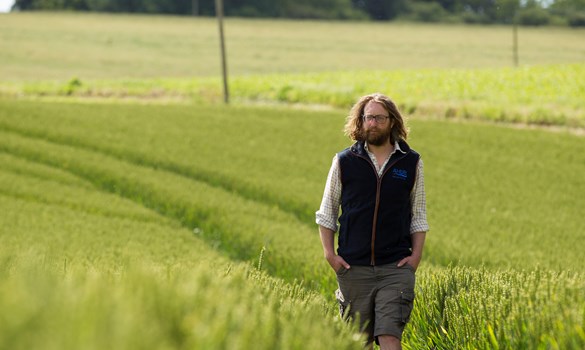Monitor Farm meeting: Canterbury
YEN (Yield Enhancement Network) Strategies to break your yield barrier
Join us to learn how YEN can assist farmers in developing robust cropping strategies so to achieve good yield consistency.
As arable farmers strive to reduce costs of production to combat volatility and the loss of farm subsidy, one of the key strategies is to maximise yield to spread those costs. With yields plateauing over recent years, the ADAS YEN programme seeks to explore new science and cultivate sharing of best practice to raise average yields towards the crop’s genetic potential in any given growing location. Therefore, at this meeting you will learn how being part of YEN can assist
Speakers
- Professor Roger Sylvester-Bradley (Head of Crop Performance with ADAS RSK Ltd)
- Alex Wilcox (Farmer & Agronomist) YEN 2018 Milling Wheat Quality Winner
Programmme
- Registration
- Welcome and introduction: Paul Hill – AHDB Cereals & Oilseeds Knowledge Exchange Manager (South East)
- Operational and YEN up-date: Will Smith (Canterbury Monitor Farmer)
- Tackling the yield plateau (YEN): Prof. Roger Sylvester-Bradley (ADAS RSK Ltd)
- What is YEN?
- Potential yields in UK
- Understanding crop science, crop requirements and resources
- Biophysical potential of cereal yields
- Research and developments
- Agronomics
- What data YEN produces and how to utilise it
- Will’s YEN 2020 Entry and husbandry strategies
- Break-out session - Nutrient strategies YEN 2020 for at Beaute Farm
- Feedback: Prof. Roger Sylvester-Bradley (ADAS RSK Ltd) & Mark Chandler
- Theory into practice – my methodology of producing yield with quality: Alex Wilcox –YEN 2018 Milling Wheat Quality Winner
- Event Summary
- Lunch
About Canterbury Monitor Farm
Will Smith farms with his father, brother and one other employee at Beaute Farm near Canterbury. Covering some 765 ha, of which 190 ha are owned, 100 ha are rented and the rest managed under varying contract farming agreements; the land features a variety of soil types including chalk loam, brick earth and marsh clay. William grows milling wheat, oilseed rape, beans quinoa and maize for a local anaerobic digestion plant. Alongside their crops the farm has a sheep and beef enterprise, straw and hay and property development businesses.
Will wants to improve his net margins through reducing input costs, via integrated farm and pest management; reducing his impact on the environment and supporting local biodiversity. Over the next three years William is keen to use the Monitor Farm programme to improve his farming methods and strategies, helping him to identify opportunities from the challenges ahead.
To find out more visit the Canterbury Monitor Farm page.
About Monitor Farms
AHDB Monitor Farms bring together groups of like-minded farmers who wish to improve their businesses by sharing performance information and best practice around a nationwide network of host farms. AHDB organises and facilitates Monitor Farm meetings for farmers, who own and operate the scheme – by farmers, for farmers. Monitor Farms are part of the AHDB Farm Excellence Programme. Each Monitor Farm project runs for three years.


